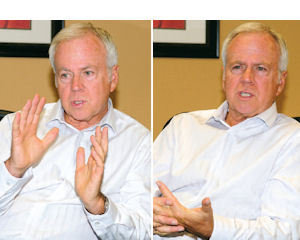Some of the clients that Craig Szabo serves don’t visit his office. He sees them on their turf—a basketball arena or football stadium, for example. Szabo often handles the finances of professional athletes. To best serve them, he says, the emphasis is often on identifying good investments and preparing for a life off the playing field. Question: How big is your professional athlete practice? Answer: We handle a handful of sports folks.With every athlete, it is a lot of work. Generally they have a lot of things going on. It is something I have been doing for many years and I know the business.We get referrals from other advisers because they know we have the expertise, particularly in the tax area. The tax area of athletes is more unique than any other profession. Q: Why is that? A: The term jock tax is a term commonly used for professional athletes. They have to pay tax in every state they play in. The teams will break down their salary. It’s part of a unitary tax system where the professional athletes have to pay tax to a state where they earn the income in. Q: Why are professional athlete clients more challenging to serve than others? A: You have to have a CPA or tax accountant who understands how to prepare the returns because there are a lot of nuances with their returns.Aside from all the state issues, a lot of athletes get paid for endorsements. That is other income that gets treated differently.A lot of athletes tend to have homes in different states. There are limitations on mortgage interest deductions with a primary and secondary home. Q: Are athletes open to receiving recommendations about their finances? A: They are open, although I do find they are not the best communicators. My personal experience is they do not want to deal with financial stuff. They are making the money and they want to focus on playing, on the game and on practice. We’ll recommend something, and a lot of time they’ll say, ‘Whatever you think is fine.’They do not engage a lot of discussion. Q: Athletes are accustomed to receiving special treatment. Does that pose a challenge? A: A lot of advisers, unless you’re tough and experienced, go along with what the client wants and doesn’t go on record saying, ‘You shouldn’t do that.’You get ‘yes’ people. They don’t want to upset the client because they might lose the client. It’s an ethical thing as a CPA, where we have to tell them the right thing. It might be at the sacrifice of losing a client.
